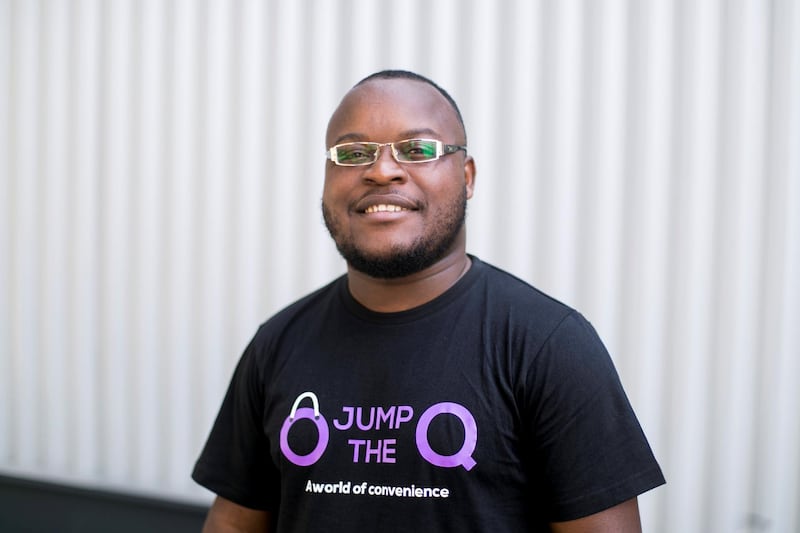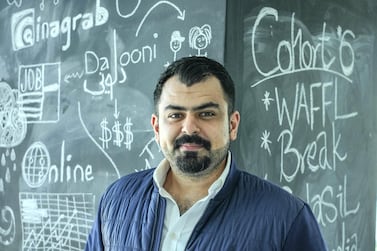For Munga Aaron Nkombou, entrepreneurial instinct first kicked in when, having moved to Dubai as a young professional, he found it difficult to transfer money to his native Cameroon.
While Western Union had branches in that country's capital Yaounde, the rest of the nation remained inaccessible, with fellow Cameroonians relying on trusted persons to physically hand over money when visiting their relatives in rural areas.
That was in 2014 and the e-payments sector in Africa has changed considerably since, with mobile wallets becoming an easy way to make transactions across the continent. Mr Munga shifted gears along with his co-founder Kaustav Murli Parameswaran, who both worked in events management. They realised they may be able to find quick solutions for more first-world problems - helping people cut back the time they spend in queues for services.
Jump the Q, which launched in 2017, taps into the convenience segment, where consumers frustrated with getting orders wrong over the phone, or waiting in line to get errands done, turn to an app to make life easier.
“In a grocery shop, you have 15 to 20 per cent in terms of transaction volumes which are just walk-ins, and 15 per cent of people ordering on WhatsApp, or through [other] apps. At least 40 per cent of volumes [are] over the phone as well and that comes with a lot of challenges such as getting orders wrong,” says Mr Munga.
"We feel that this is the window of opportunity that we can exploit to get the traffic that is still offline and kind of bring them online,” he adds.
Jump the Q, which is still in pre-seed phase, was created when Mr Munga still had a full-time job. He and Mr Parameswaran would finish their work and then head over to the library at Dubai International Financial Centre to continue working on their start-up, often up to midnight, or even later.
"Sometimes I would work until 4am when I’m supposed to go to work at 8am,” says Mr Munga.
Securing funding for a start-up, bootstrapped by salary and savings, also proved a challenge.
Luckily for Mr Munga and Mr Parameswaran, a visit to the UAE by a friend from Namibia proved a windfall for the business. Hilma David made the first external commitment of $10,000.
However, the early entrepreneurial days while being a full-time employee eventually took its toll. Mr Parameswaran had to leave his day job, when his company found about the start-up on the side. Mr Munga stayed on but things had started to get really difficult.
In order to keep the start-up afloat, the duo offered equity stakes in the business in return for bringing onboard people with different skillsets.
“We realised that to keep the business going if we don’t have money, [the way] is to find people with skills that we don't have and probably give them some kind of ownership in the business,” says Mr Munga.
A partnership with 721 Capital, which is based in the Congo and South Africa proved successful, with the venture capital fund supporting the pair in terms of software development.
Luck also led them to Abu Dhabi-based angel investor Nabil Abdul Rahman whom Mr Munga connected with via an online platform for start-ups, the Angel Investment Network.
They clicked right away and after three weeks of discussion, which involved Mr Munga meeting Mr Abdul Rahman in Ibn Battuta mall, the start-up pre-seed funding.
Jump the Q is currently working on a six-month plan to secure seed funding and is targeting Series A by mid-2020.
"By 2020, we look to expand into markets within the Mena region and [after that] we’ll be looking at other markets,” says Mr Munga.
South Africa will be the first country outside the Mena region that Jump the Q would look to target, mainly by leveraging the pair's relationship with their South African investor 721 Capital, which has significant network and outreach in the market.
Much like start-ups that look to scale and expand outside the UAE, Jump the Q is also eyeing the lucrative Saudi Arabian market.
"It’s a very big market even in terms of population and we really think our model would work better there [particularly] taking into account the culture of shopping online,” says Mr Munga.
Jump the Q generates revenues from the small transaction fee it charges when customers opt for a service. The app currently has 500 active users, which Mr Munga says will increase to 10,000 or 20,0000 by year end.
Next month, a cleaning service will be added to the app, with laundry services coming online by the end of June.
The firm will look to work with smaller businesses not only to provide cheaper services for customers but also to enable such retailers to access a wider market through a broad platform such as an app.
Jump the Q, which is registered in Abu Dhabi and has enjoyed mentorship from the Abu Dhabi Global Market, says discussions are ongoing with larger entities in the emirate to secure funding.
"In terms of funding, we’re in discussions with a few investors. One major player that I made contact with [is] Shorooq Investments.
"Hopefully, when we come to a funding mandate where they can participate, I really hope that we would be able to work with them,” he adds.








